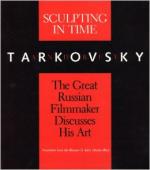
|
| Name: _________________________ | Period: ___________________ |
This quiz consists of 5 multiple choice and 5 short answer questions through Chapter III.
Multiple Choice Questions
1. In what year did Tarkovsky die?
(a) 1990.
(b) 1986.
(c) 1988.
(d) 1978.
2. Where did Tarkovsky study film-making?
(a) Moscow Institute of Film Studies.
(b) State Institute of Cinematography.
(c) Paris Institute of Cinema Studies.
(d) Ukrainian Institute of Cinematography.
3. What does Tarkovsky write "has taken a wrong turn in abandoning the search for the meaning of existence in order to affirm the value of the individual for its own sake"?
(a) Dadaism.
(b) Modern art.
(c) The Realistic Movement.
(d) Mankind.
4. Tarkovsky writes in the Introduction that the public condemned his film Mirror for being "inadmissibly" what?
(a) Artistic.
(b) Elitist.
(c) Boring.
(d) Slow.
5. Tarkovsky states that cinema's unique aspect is this capturing and shaping of what?
(a) Space.
(b) Time.
(c) Story.
(d) Character.
Short Answer Questions
1. Of what artist does Tarkovsky write when, "he was dying of hunger went off into the mountains with a home-made bow and arrow to shoot some sort of game" in Chapter I?
2. What film did the woman civil engineer from Leningrad write to Tarkovsky about in the Introduction?
3. Tarkovsky concludes the Introduction by stating, "The corpus of theory relating to cinema is still" what?
4. Tarkovsky claims that _______ and beauty are contained within each other.
5. In what film does the Editor's note that is added in the commentary in this edition, appear as it was Tarkovsky's final film?
|
This section contains 229 words (approx. 1 page at 300 words per page) |

|




